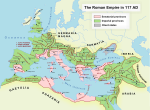The administration of Judaea as a province of Rome from 6 to 135 was carried out primarily by a series of Roman Prefects, Procurators, and Legates pro praetore. These administrators coincided with the ostensible rule by Hasmonean and Herodian rulers of Judea. The Roman administrators were as follows:
"Hadrian stationed an extra legion in Judaea, renaming it Syria Palaestina." This was following the defeat of the Bar Kokhba Revolt in 135. The Syria-based legion, Legio III Gallica, took part in the quelling of the revolt from 132 to 136, and in the aftermath, the emperor Hadrian renamed the province of Judea and its extra legion Syria Palaestina. The province of Syria Palaestina was divided into Palaestina Prima and Palaestina Salutaris in about 357, and by 409 Palaestina Prima had been further split into a smaller Palaestina Prima and Palaestina Secunda, while Salutaris was named Tertia or Salutaris. Palæstina Prima or Palaestina I existed from the late 4th century until it was temporarily lost to the Sassanid Empire (Persian Empire) in 614, but re-conquered in 628 and finally until the Muslim conquest of the Levant in the 630s.
See also
- Kings of Israel
- Kings of Judah
- Herodian Dynasty
- List of High Priests of Israel
- Syria Palaestina
- Promagistrate
References
- "Ancient Inscription Identifies Gargilius Antiques as Roman Ruler on Eve of Bar Kochva Revolt". December 2016.
- Adkins & Adkins 1998, p. 121.
- DAN, YARON (1982). "Palaestina Salutaris (Tertia) and Its Capital". Israel Exploration Journal. 32 (2/3): 134–135. JSTOR 27925836.
The division of Palestine into two provinces, Palestina Prima and Southern Palestine, later to be known as Palaestina Salutaris, took place in 357-358 In 409 we hear for the first time of the three provinces of Palestine: Palaestina Prima, Secunda and Tertia (the former Salutaris)
- Lewis 2011, p. 155; Britannica, Palestine - Roman Palestine: At the end of the fourth century, an enlarged Palestine was divided into three provinces: Prima, with its capital at Caesarea; Secunda, with its capital at Scythopolis (Bet Sheʾan); and Salutaris, with its capital at Petra or possibly for a time at Elusa.; Shahin 2005, p. 8
Sources
- Adkins, Lesley; Adkins, Roy A. (1998). Handbook to Life in Ancient Rome. Oup USA. ISBN 978-0-19-512332-6.
- Lewis, Bernard (April 15, 2011). Islam in History: Ideas, People, and Events in the Middle East. Open Court. ISBN 978-0-8126-9757-5.
- Shahin, Mariam (2005). Palestine: A Guide. Interlink Books. ISBN 1-56656-557-X.
- "Palestine - Roman Palestine". Encyclopedia Britannica. Retrieved December 24, 2020.
